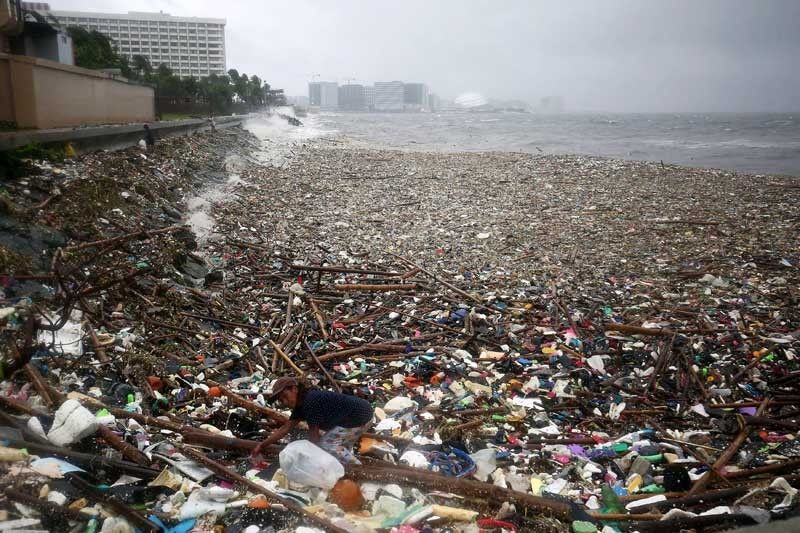It is more fun criticizing
January 14, 2018
Subject: Taking personal responsibility for what happens around us
--
January 14, 2018
Subject: Taking personal responsibility for what happens around us
1. Responsibility for cleanliness 5s in the workplace:
 Why is picking up trash leadership (and not doing is mediocrity?)
Why is picking up trash leadership (and not doing is mediocrity?)

1. There was a feature today about a Danish intern at Danish Embassy who is observed to picking up trash daily while going home at Bonifacio Heights. Comments on the post say it is sampal sa Pinoy
2. There was an urban legend regarding Tan Cak Tiong chairman of Jollibee picking up trash while visiting a branch at the North. It was rumored that afterwards, that Jollibee in the north became a model of cleanliness
3. The Manila bay is a model of being filthy and smelly and its only lately that DENR is taking serious attention about this. The waste accumulating at Manila Bay, a bad Feng Shui (malas, hindi aasenso, maligalig na pamumuhay) was traced to:
1. Institutional waste, from factories, govt offices, including govt entity:
Hospital, Manila zoo but most comes from urban settlers using
the estero draining into Manila bay as toilets and sewers, and garbage
dump
SEC Cimatu of DENR notes commercial establishments and informal urban settlers for massive pollution
of Manila Bay (333 mn ppm vs standard of only 100)!!!!
 Why is this ahppening? The govt is to be blamed?
Why is this ahppening? The govt is to be blamed?

SEC Cimatu of DENR notes commercial establishments and informal urban settlers for massive pollution
of Manila Bay (333 mn ppm vs standard of only 100)!!!!


Eh pusali iyan eh; basurahan, hindi body of water
 And we call Philippines Pearl of the Orient Seas?
And we call Philippines Pearl of the Orient Seas?
True ??????

True ??????
4. At the SBU, say Calapan, Pangasinan, La Union, HAMP, it is a constant battle about keeping the Park clean because it:
1. It is a park
2. It is part of 5s
3. It is part of COBS
There are proofs that many are none compliant We are all victims of indifference and a system that
corrupts the mindset of professionals to be corrupt (marumi mabaho)
corrupts the mindset of professionals to be corrupt (marumi mabaho)
5. At the 3f, the base of the stairway is often littered with trash, and none seems to mind. The undersigned does the job of picking up the trash and none seems embarrassed, reflecting the indifference and lack of responsibility being part of the team and caring for the workplace.
This despite the admonition that: what you observe around you as dirty workplace is a reflection of your personality and your understanding of your world and your faith (and your regards for the superiors or the owners)
6. Operationally it is simply not being responsible and having the mindset:
It is anybody, somebody, nobody, everybody
Here's the story, titled "Whose Job Is It, Anyway?"
This is a story about four people named Everybody, Somebody, Anybody and Nobody. There was an important job to be done and Everybody was sure that Somebody would do it. Anybody could have done it, but Nobody did it. Somebody got angry about that, because it was Everybody's job. Everybody thought Anybody could do it, but Nobody realized that Everybody wouldn't do it. It ended up that Everybody blamed Somebody when Nobody did what Anybody could have.
The story may be confusing but the message is clear: no one took responsibility so nothing got accomplished.
It's a story that plays out often in organizations and companies and on teams—anywhere there is culture that lacks accountability.
But how do you get people to take responsibly for their work? Different things work in different situations, but here are some strategies that have proven to be effective:
Become a role model. You can't tell people what to do if you yourself aren't willing to hold yourself to the same level. If you want people to act responsibly, you have to be accountable. Your team and your company look to you for direction.
Don't make assumptions. Don't assume that others know instinctively what to do and when to do it, or even what you expect from them. Before people can take responsibility for their work they require clear communication. The more you communicate, the better the results are likely to be.
Set the standard. If you expect excellence, it's up to you to set the standards for results and performance. Make each task or goal measurable and set it on a reasonable timeline so it's achievable. Give people a clear target and they'll work to reach it—and maybe even surpass it.
Get the buy-in to go the distance. You need people to buy in and commit if you want to succeed. Each vision should be compelling; each goal should build toward the whole; each task should be laced with motivation. You need people to feel compelled, inspired and motivated to take responsibility.
Make regular check-ups. One of the biggest reasons people fall short is a lack of follow-through by leadership. Help people stay focused by setting up regular checkpoints—phone calls or meetings where everyone can communicate and catch up, staying focused on moving forward and being accountable. When people know there will be check-ups, they're less likely to procrastinate and more likely to hit their targets.
Provide support and training. Especially with a start-up or a new initiative, people are taking on projects or tasks that they've never faced before. Make sure everybody has the training and resources they need to be successful, and provide help in resolving any issues that may arise.
Encourage candor. One of the worst things that can happen to a team is for people to feel uncomfortable discussing problems and expressing their honest opinions. Build a culture of candor so that people know it's the norm to tell the truth, even when it's difficult or awkward.
Concentrate on solutions and not only problems. If people are having problems or falling behind, expect them to come to you with possible solutions, not just the problems. Create an expectation that the first response to a problem is to start finding solutions.
Praise performance. Praise people for good results and be specific with your acknowledgment. Let them know what they did well and how their work is affecting others. If they fall short, coach them privately and let them know how they can improve. And if their performance does not improve, also address this with meaningful consequences that have been explained ahead of time.
To avoid having your team become Everybody, Somebody, Anybody and Nobody, commit to becoming the kind of leader who takes responsibility for your own life and leadership.
Lead from within: Don't let Anybody (or Everybody, Somebody or Nobody) stop you from doing what you need to do to create the kind of leadership and life you can be proud of.
7. In a speech by Mar Roxas in 2005, he urges every one to take personal responsibility for what happens around us, and not expect the government, as it were a knight in shining armor (the height of socialism) to take care of our needs and problems. If we pick up trash, or observe traffic rules, do our share, then we can be better. Thre is a huge gap between our expectations, and wishes and our persona actions.
Nothing can be higher of moral and personal leadership if we do this...(from lecture Fresh Start on the Filipino dream
PAGSASANAY SA TAGUMPAY (Training for Success)

